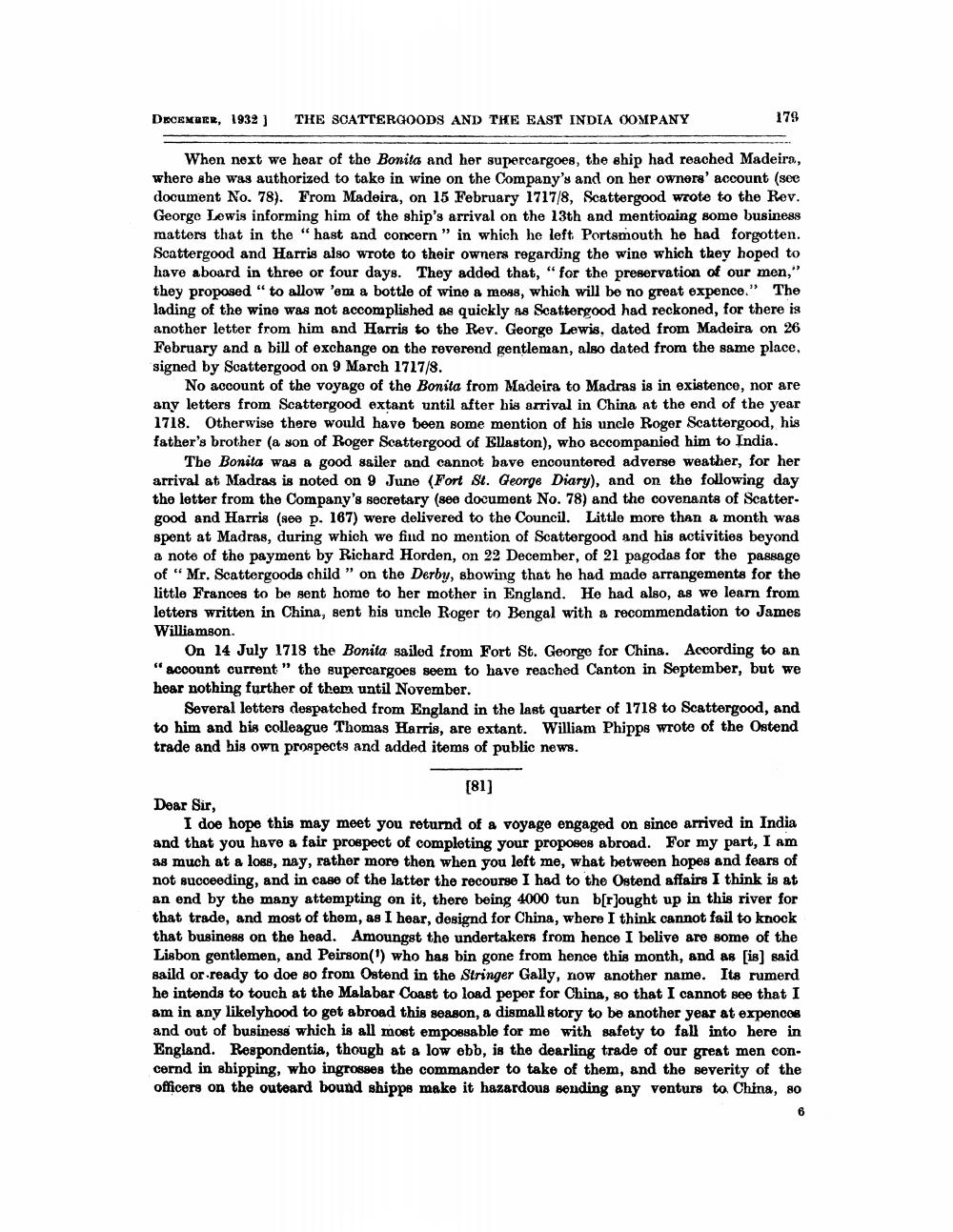________________
DECEMBER, 1932]
THE SCATTERGOODS AND THE EAST INDIA COMPANY
179
When next we hear of the Bonita and her supercargoes, the ship had reached Madeira, where she was authorized to take in wine on the Company's and on her owners' account (see document No. 78). From Madeira, on 15 February 1717/8, Scattergood wrote to the Rev. George Lewis informing him of the ship's arrival on the 13th and mentioning some business matters that in the "hast and concern" in which he left Portsmouth he had forgotten. Scattergood and Harris also wrote to their owners regarding the wine which they hoped to have aboard in three or four days. They added that, "for the preservation of our men," they proposed “to allow 'em a bottle of wine a megs, which will be no great expence." The lading of the wino was not accomplished as quickly as Scattergood had reckoned, for there is another letter from him and Harris to the Rev. George Lewis, dated from Madeira on 26 February and a bill of exchange on the reverend gentleman, also dated from the same place, signed by Scattergood on 9 March 1717/8.
No account of the voyage of the Bonita from Madeira to Madras is in existence, nor are any letters from Scattergood extant until after his arrival in China at the end of the year 1718. Otherwise there would have been some mention of his uncle Roger Scattergood, his father's brother (a son of Roger Scattergood of Ellaston), who accompanied him to India.
The Bonita was a good sailer and cannot bave encountered adverse weather, for her arrival at Madras is noted on 9 June (Fort St. George Diary), and on the following day the letter from the Company's secretary (see document No. 78) and the covenants of Scattergood and Harris (see p. 167) were delivered to the Council. Little more than a month was spent at Madras, during which we find no mention of Scattergood and his activities beyond a note of the payment by Richard Horden, on 22 December, of 21 pagodas for the passage of "Mr. Scattergoods child " on the Derby, showing that he had made arrangements for the little Frances to be sent home to her mother in England. He had also, as we learn from letters written in China, sent his uncle Roger to Bengal with a recommendation to James Williamson
On 14 July 1718 the Bonita sailed from Fort St. George for China. According to an "account current" the supercargoes seem to have reached Canton in September, but we hear nothing further of them until November.
Several letters despatched from England in the last quarter of 1718 to Scattergood, and to him and his colleague Thomas Harris, are extant. William Phipps wrote of the Ostend trade and his own prospects and added items of public news.
[81] Dear Sir,
I doe hope this may meet you returnd of a voyage engaged on since arrived in India and that you have a fair prospect of completing your proposes abroad. For my part, I am as much at a loss, nay, rather more then when you left me, what between hopes and fears of not succeeding, and in case of the latter the recourse I had to the Ostend affairs I think is at an end by the many attempting on it, there being 4000 tun b[rought up in this river for that trade, and most of them, as I hear, designd for China, where I think cannot fail to knock that business on the head. Amoungst the undertakers from hence I belive are some of the Lisbon gentlemen, and Peirson(') who has bin gone from hence this month, and as [is] said saild or ready to doe so from Ostend in the Stringer Gally, now another name. Its rumerd he intends to touch at the Malabar Coast to load peper for China, so that I cannot see that I am in any likelyhood to get abroad this season, a dismall story to be another year at expencos and out of business which is all most empossable for me with safety to fall into here in England. Respondentia, though at a low ebb, is the dearling trade of our great men concernd in shipping, who ingrosses the commander to take of them, and the severity of the officers on the outeard bound shipps make it hazardous sending any venturs to China, 80




